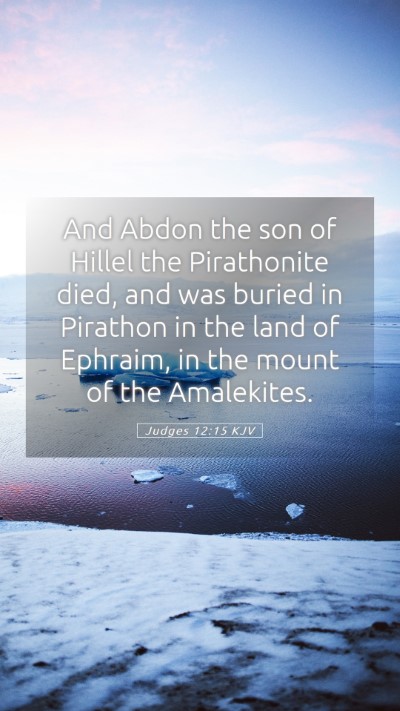Old Testament
Genesis Exodus Leviticus Numbers Deuteronomy Joshua Judges Ruth 1 Samuel 2 Samuel 1 Kings 2 Kings 1 Chronicles 2 Chronicles Ezra Nehemiah Esther Job Psalms Proverbs Ecclesiastes Song of Solomon Isaiah Jeremiah Lamentations Ezekiel Daniel Hosea Joel Amos Obadiah Jonah Micah Nahum Habakkuk Zephaniah Haggai Zechariah MalachiJudges 12:15 Meaning
What is the meaning of Judges 12:15?
And Abdon the son of Hillel the Pirathonite died, and was buried in Pirathon in the land of Ephraim, in the mount of the Amalekites.
Judges 12:15 Bible Verse Meaning
Understanding Judges 12:15
Judges 12:15 states:
"And Abdon the son of Hillel the Pirathonite died, and was buried in Pirathon in the land of Ephraim, in the mount of the Amalekites."
This verse serves as a concluding note on the life and death of Abdon, a judge of Israel. It highlights several themes such as leadership, territorial significance, and the ongoing conflict with the Amalekites.
Bible Verse Meaning
The significance of Judges 12:15 can be unpacked through various interpretations:
- Leadership Transition: Abdon's death signifies yet another transition in leadership within Israel. Matthew Henry emphasizes the cyclical nature of judges in Israel and how their deaths often lead the nation into different challenges.
- Territorial Insights: The mention of Pirathon and its location in Ephraim suggests the geographical and tribal significance of the judges' influence. Albert Barnes notes that understanding these locations can offer deeper insight into the historical conflicts faced by the Israelites.
- Conflict with the Amalekites: The reference to the Amalekites symbolizes the ongoing struggles between Israel and its enemies. Adam Clarke points out that these figures represent the spiritual battles that believers face, emphasizing the need for divine assistance.
Bible Verse Interpretations
To interpret Judges 12:15 meaningfully, one must consider:
- Historical Context: The period of the judges was marked by instability and cycles of sin, repentance, and deliverance. Knowing this context aids in understanding the urgency of each leader's role.
- God's Sovereignty: Each judge, including Abdon, was divinely appointed, illustrating how God raised leaders for His people during times of need.
- The Community's Responsibility: The references to the judge's burial site serve as a reminder of the community's role in honoring their leaders and preserving their legacy.
Bible Verse Understanding
Through detailed Bible verse commentary and exegesis, the following insights can be drawn:
- The narrative reflects not just on Abdon’s life but symbolizes broader lessons about authority and divine leadership.
- The location of burial provides a physical marker of where the impacts of these leaders were felt the most.
- Understanding how previous judges influenced the nation helps one anticipate future challenges and needs for leadership.
Bible Verse Explanations
The explanation of Judges 12:15 is multifaceted and includes:
- Endurance of Warfare: Abdon's reference to Amalekites points to the enduring nature of conflicts Israel faced, comparable to personal struggles faced in daily life.
- Legacy of Leadership: Following a leader’s death, the subsequent absence often results in chaos, underscoring the importance of wise succession planning.
- Memory and Mourning: The burial site serves as a reminder for future generations of the sacrifices made by their leaders.
Scripture Analysis and Biblical Exegesis
In analyzing Judges 12:15, we can apply various study tools:
- Comparative Text Analysis: Comparing with other judges' narratives reveals patterns in Israel’s spiritual journey (Judges 3:7-11; Judges 10:1-5).
- Historical Contextualization: Understanding how neighboring nations affected Israel’s journey can enhance comprehension (I Samuel 15:1-9).
- Application in Modern Context: How these themes resonate today can reflect personal leadership challenges and community struggles.
Cross References
This verse relates to other significant passages:
- Judges 5:14 - The role of Ephraim in Israel’s victories.
- 1 Samuel 15:2 - Reflects on the ongoing battles against the Amalekites.
- Judges 8:24 - The understanding of leadership and community dynamics in Israel.
Conclusion
Judges 12:15 encapsulates powerful themes of leadership, community responsibility, and the spiritual battles that permeate human experience. By engaging in Bible study and utilizing Bible study resources, readers can uncover profound meanings that resonate with their own journeys.


